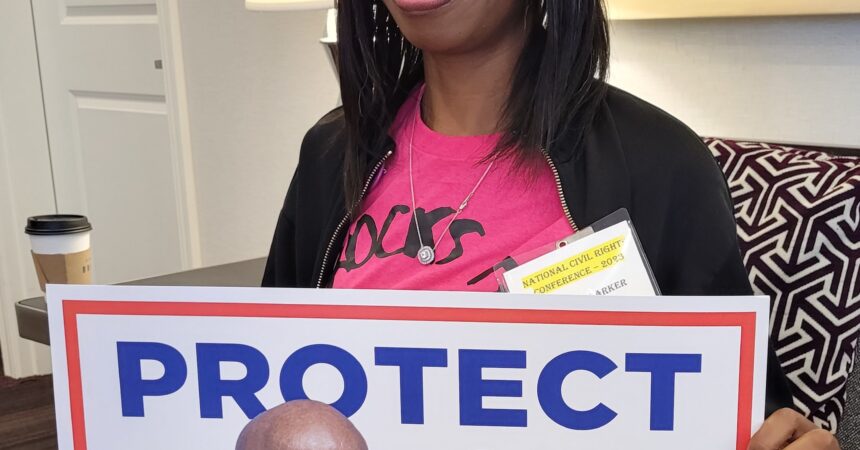
Securing voting rights more than a topic at Civil Rights Conference

Eddie Beal participated in panel discussion after a documentary that featured his grandmother and civil rights activist Naomi King.
Photo by St. Clair Murraine
Keith Parker, Ph.D., was one of the coordinators of the National Civil Rights Conference held in Tallahassee.
Photo by St. Clair Murraine

Photo by St. Clair Murraine
By St. Clair Murraine
Outlook Staff Writer
Just about every civil rights issue facing Blacks around the country was in some way part of the agenda during the National Civil Rights Conference, which wrapped up two days of discussions in Tallahassee.
Diversity, equity and inclusion came up. So did banned books and other cancel culture laws.
None of the issues, however, was as burning as the attempts to suppress or intimidate the Black vote.
Like many who attended the session at the Residence Inn by Marriott on Gaines Street, Jessica Fortune Barker has been pushing back against unjust voting rights changes. Fortune Barker is co-founder of Lift Our Vote, a movement that she started in her hometown Huntsville, Ala.
During a run for an elected seat in her hometown, she got an up close look at how much Blacks and other underserved ethics groups don’t know about voting rights.
“We know that systemically society tries to withhold information from certain communities,” said Fortune Barker, who also is CEO and principal consultant with Affluent Business Consulting. “We know knowledge is power so if you can refrain from letting the community access knowledge though education, books, and written documents then you can suppress that community from understanding the process of voting.
“Naturally if you don’t understand something you’re not going to seek it, you’re not going to want to be involved in it (and) you’re not going to want to participate.”
Some of the changes in voting laws prohibit third-parting voting registration. Voting by mail and using drop boxes at polling sites are also affected by some of the changes seen across the country.
Keith Parker, Ph.D., who led organization of the conference, suggested that hope for stopping the voting rights attack is in the hands of the next generation. He pointed to recent elections as proof.
“Young people are committed,” Parker said. “All we have to do is look at the last two elections. Young people voted in numbers greater than in previous years.”
Parker also pointed to the large number of young people who marched with Rev. Martin Luther King for civil rights in the 1960’s. That dynamic with today’s young people could be “coming to fruition now,” Parker said.
Both Parker and Fortune Barker said that educating Blacks about the voting process is an essential part of stopping purging of the 1965 Voting Rights Act.
“What they’re doing is watering down the history and the culture of a whole community,” she said. “Look at slavery and how they stripped us from knowing our own history, religion (and) culture. When you can take away someone’s identity you have room to create what you want them to be because they have nothing to identify with. That’s what we are seeing.”
In addition to the current issues, King’s legacy was also referenced in some presentations. There was also a session on Tallahassee’s Civil Rights Heritage Walk. Another feature was a lengthy documentary tribute to the civil rights activists who did their work in Tallahassee.
Sheyann Webb, who at age 9 was the youngest known participant who took part in the historic march from Selma to Montgomery known as “Bloody Sunday,” also attended the conference.
Increasing the involvement of young people in the civil rights movement is a little different than it was during King’s era. New media could help, but civil rights attorney Devon Westhill wasn’t sure how effective that would be.
“The civil rights movement of the 20th century was affective because you had thousands upon thousands upon thousands of people marching in the streets and saying this is wrong,” said Westhill, who was a panelist whose topic was “Shall we overcome? Using new media to protect civil rights and make social progress.”
King’s lineage was also featured in the documentary “Maomi King, The Butterfly queen: From tragedy to peace.” The 56-minute film focused on the work of King’s sister-in-law during the civil rights movement.
King’s great nephew Eddie Beal, who participated in panel discussion after the documentary, said the conference is one of many examples why addressing civil rights issues is important.
“It’s more continuing on with the struggle,” said Beal, who grew up with a front porch view of the civil rights movement. “That’s stuff we were doing yesterday, we need to be doing it today and we need to be doing it in the future as well, engaging the next generation. That’s the most important thing that we can do.”
He added that fighting back against the cancel culture movement is imperative.
“If we allow that narrative to continue without having a voice in it, then I believe that we are going end up going back and end up in the way of a lot of the progress that we made,” he said. “We need to continue to engage and right the injustices that exist.”







